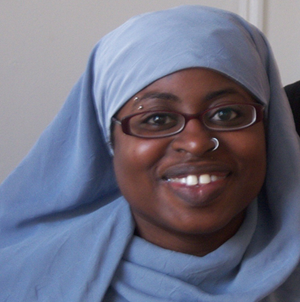Samaa Abdurraqib is a contributor to I Speak for Myself: American Women on Being Muslim. Her essay in the book is titled "Connections." The following is an original essay for Our Inner Lives.
 I’ve lived in Maine for exactly a year now. I’ve lived in Maine for exactly a year now.
I’m sure of this because I can vividly remember last year’s Ramadan. Last year, I started fasting on August 11th – two days after making the three-day road trip from Wisconsin to Maine. That Ramadan was a blur to me: finishing the move; finishing my dissertation; buying new furniture; new faculty orientation; finding a gym; finishing my syllabi. The list goes on. One distinct memory that I have is a recognition that the spiritual component to my fast was a bit lacking. Life was a blur, but I didn’t feel at all connected to my spirituality during Ramadan. I initially attributed this to the fact that I was distracted and being pulled in multiple directions. But, now that this year’s Ramadan is over, I’m recognizing that this lack of connection is related to the absence of a spiritual anchor. Namely, the Muslim friends by whom I had been surrounded in previous years.
So, I’ve lived in Maine for a year now. I teach at a small, liberal arts college; I live in the same small town where the college is located. As far as I know, I am the only Muslim in this small town. As a matter of fact, I believe that I am the only Muslim faculty member at the college. Actually, there may be one more, but this person and I have never officially met. There are a few Muslim students on the campus. When I say “a few,” I mean a few – I believe there are eight students who identify as Muslim. That’s eight out of just over 1,200 students. I interact with these students as the advisor to the Muslim Students’ Association, but they’re not my peers. Most of them look to me to help with spiritual advice; most of them are just beginning to think about their spiritual identities. They can’t provide the kinds of connections I’m looking for. And, in any case, they’re gone over the summer; they weren’t around this Ramadan. Because of all of this, I generally feel alone in my spirituality. This loneliness nagged at me constantly during this year’s Ramadan as I attempted to focus on the spiritual component of the month.
I like to consider this holy month as having two distinct components: the physical and the spiritual. The physical – i.e. abstaining from food and drink – can be a test and a trial, but that’s the part that I find the most manageable. The compulsory nature of this physical component is highlighted in several verses of the Qur’an. One such verse states: “O you who believe! fasting is prescribed for you, as it was prescribed for those before you, so that you may guard (against evil)” (2:183). Connecting these physical practices to a spiritual practice is, for me, the highlight of Ramadan.
The spiritual component of Ramadan became important to me when I moved into and began to occupy a more spiritual identity. I owe this move to the community of Muslim friends I found in my early 20s. During my time with these friends, Ramadan took on a whole new meaning. We broke our fast together, prayed together, read Qur’an together, and generally shared the experience of this sacred month. Spirituality became a crucial component to my observance of Ramadan. The Qur’an itself speaks of its spiritual significance: “The month of Ramadan is that in which the Qur’an was revealed, a guidance to [humankind] and clear proofs of the guidance and the distinction” (2:185). The profound importance of just this verse reverberates throughout the month.
One such way to honor this spiritual significance is to read the entire Qur’an in the month of Ramadan. Some Muslims will make an effort to read Qur’an every night as part of their spiritual practice, with the goal of getting through the entire text in the 30 days. One particular spiritual practice that facilitates this in a communal manner is observing nightly Tarawih, which are special prayers that are performed after the last prayer of the night. Tarawih are performed at a mosque and in juma’a (congregation) – unlike most other prayers that can be performed anywhere. Those who are leading the prayer attempt to recite an entire juz’ (section of the Qur’an) a night. Depending on which juz’ is being recited, praying Tarawih can take a couple of hours, or it can take all night. Yes, this can seem physically exhausting, but the intense focus on spiritual connection is exhilarating.
Another spiritual practice is observing Lailut-ul-Qadr (Night of Power). This night is mentioned in the Qur’an – in fact, an entire chapter is dedicated to it. Chapter 97, Al-Qadr reads:
Surely we have revealed this [message] on the Night of Power. And what will make you comprehend what the Night of Power is? The Night of Power is better than a thousand months. The angels and Gibreel descended in it by the permission of Allah for every affair. Peace! It is till the break of the morning.
During these nights many Muslims stay up until dawn, praying, reading Qur’an, and engaging in supplication – all of which can be spiritually invigorating.
These spiritual practices are not a mandatory part of Ramadan, but, when I was a part of a Muslim community, my friends and I engaged in these practices with excitement. Our group was dynamic, engaging, and affirming – their dedication to their spiritual growth fed and inspired my dedication to my spiritual growth.
Despite these spiritually nourishing experiences with my Muslim friends, I sometimes think about spirituality as a solo endeavor. The crux of one’s spirituality rests on their individual relationship to God or whatever larger force(s) they recognize as being at work in the universe. Forging and maintaining this connection is often grueling in the face of a myriad of distractions that exist in the world around us. Ultimately, I think, one embarks on these spiritual struggles and journeys alone. And yet, I don’t want to overlook the communal aspects of spirituality – the importance of which was not lost on me during this year’s Ramadan.
Unlike last Ramadan, I was committed to having a meaningful spiritual experience this year. I started thinking about my goals early: praying in a timely manner; never missing suhur (the morning meal); reading Qur’an in the morning; abstaining from vulgarity; keeping my anger at bay; reading Hadith (the sayings or deeds of the Prophet Muhammad); abstaining from other excessive activities (for me, shoe shopping). I was excited to get started. But, as Ramadan got closer, my enthusiasm began to wane because I didn’t have anyone with whom to share my excitement.
Fasting among mostly non-Muslims is an interesting experience. Although I’ve only lived in Maine for a year, I’ve made several good friends; I’ve also made kind and generous acquaintances. It’s been amazing to find all of these people in my life at this point, and I don’t want to give the impression that I don’t cherish and appreciate how fortunate I’ve been to have these people in my life. Yet, as Ramadan approached, I was struck by a profound feeling of loneliness. Yes, my friends, acquaintance, and colleagues are all knowledgeable and accommodating, but this doesn’t mean that they understand the spiritual significance and overall importance of this holy month. Our exchanges about Ramadan tend to be clustered into a few different types:
Type 1: lack of understanding. I’m accustomed to these exchanges. Some might know generalities about fasting, but not the specifics. I might be asked how long it lasts, what I can or can’t do, or why the dates for Ramadan shifts each year.
Type 1 is generally followed by type 2: some degree of horror or shock and disbelief. The thought of not drinking (even water) and not eating for 12 hours or longer can seem overwhelming for people who aren’t accustomed to the physical challenge. I tend to assure people that the physical commitment isn’t as rigorous as it seems. This sometimes – but not always – assuages their concerns.
The last type of reaction I receive – type 3 – is extreme accommodating and apologetic behavior. This is, of course, done with the best intentions. My friends apologize if they eat around me; apologize if they make dinner plans and invite me; bend over backwards in attempts to keep me away from food, even when I try to convince them that I really don’t mind. I am always flattered by their kindness and their concern for my discomfort, but these responses highlight the disconnection between what I’m trying to nourish on the inside and what those around me perceive. They see this month as a trial and a tribulation; I see it as a time where beauty and growth are possible. (Ramadan IS a trial, but I believe there is beauty in that trial).
This year, as Ramadan was coming to an end, I remained acutely aware of my isolation. Sometimes this aloneness is not unwelcome. For example, when I woke for suhur and prayer, I enjoyed the silence and stillness of the pre-dawn hours. During this time I felt the presence of God and I felt calm and spiritually rejuvenated as I began my fast. I was thankful for those moments – they were a blessing. But those feelings of fortitude and resilience waned throughout the day as I interacted with people who do not necessarily see or understand the spiritual bounty of the month. During the period of Lailut-ul-Qadr, I felt this loneliness while trying to focus on reading and thikr (remembrance of God) during the night. Unfortunately, I was never able to stay up the whole night. Whenever I tried, I found myself overcome with a nostalgia for the times when my friends and I would stay up all night together reading, praying, laughing, babbling incoherently as we got drowsy. My focus was drawn away from the spiritual intensity of the moment and I lost my stamina.
This isn’t to say that my Ramadan was a complete bust. The spiritual side to my Ramadan was much stronger than it was last year; I felt more focused and connected to God and my spirituality. But it was difficult. Perhaps this isolation I’ve felt is a part of the trial that this particular Ramadan brought for me. Maybe the point of this trial has been for me to be more thankful for the friends I have had and the new friends I have made (even though they can’t be spiritual anchors for me). And maybe the point of it all is that I need to find spiritual solace despite feeling isolated.
Samaa Abdurraqib is a Visiting Professor of Gender & Women's Studies at Bowdoin College in Maine. She made the move to Maine from Wisconsin in 2010 after completing her PhD in English at the University of Wisconsin-Madison. Her research and writing focuses on: 20th-21st century diasporic women writers; violence against women; and African American Muslims in the US. Even though Samaa has traded one snowy landscape for another, she readily admits that she's not into snow.
Samaa is a contributor to
I Speak for Myself: American Women on Being Muslim (edited by Maria M. Ebrahimji and Zahra T. Suratwala, White Cloud Press, May 2011), a collection of 40 personal essays written by American Muslim women under the age of 40, all of whom were born and raised in the US. It is a showcase of the true diversity found in American Islam. www.ispeakformyself.com

|


 I’ve lived in Maine for exactly a year now.
I’ve lived in Maine for exactly a year now.